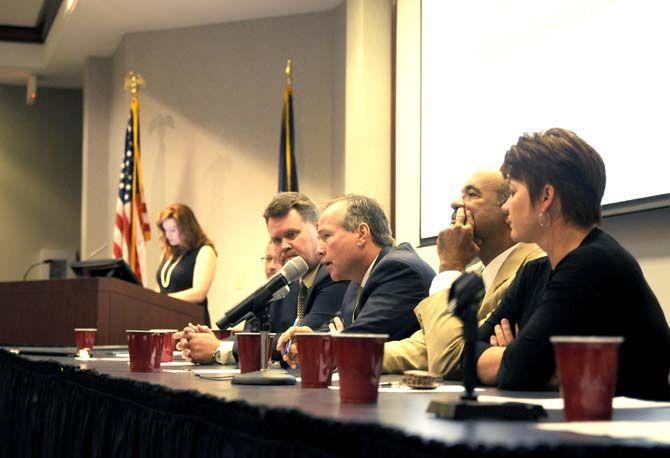The presidents of Louisiana’s higher education systems agreed cutting core funding from universities will make the money received through the Workforce and Innovation for a Stronger Economy Fund obsolete, Tommy Smith, associate vice chancellor of Finance and Administrative Services and vice provost for Finance, said Wednesday.
“They can’t come in and say, ‘LSU, we’re going to give you a $20 million cut, but we’re going to continue to give you WISE funding,’” Smith said. “It wouldn’t work.”
In January, Gov. Bobby Jindal’s administration announced Louisiana higher education could face more than $300 million in budget cuts for the upcoming fiscal year, which LSU President F. King Alexander said could lead to hiring freezes and increases in student tuition and fees.
Jindal signed the WISE Fund into law in June 2014.
This legislative initiative allocated $40 million in state funds to higher education as an investment targeted at aligning institutions with workforce needs and economic growth. The LSU System’s share of these funds was about $14 million.
While it’s still early in the in the budget development process, Smith said the WISE Fund may be cut when Jindal makes his official budget presentation at the end of the month.
“Any of our funding, we would try to protect areas that we think are critical to LSU, which for us, our number one priority is academic core, protect the students, so they can continue along their academic career path and get a degree,” Smith said.
The University’s portion of the WISE Fund was split into three spending categories totaling roughly $7.1 million: General Fund, Community Development Block Grant and House Bill 2.
“They just went and reduced the state revenues again this year,” Smith said. “We haven’t seen the governor’s plan. We have been told that they are not going to touch [the WISE Fund] for this year, but can I tell you for sure, I won’t know until I see the plan.”
Though the University received the General Fund, approximately $1.4 million, the CDBG and HB2 funding has yet to be received, Smith said. He said the Board of Regents and WISE Council are still discussing the stipulations tied to these two funding sources.
CDBG provides financial assistance for low income individuals, and HB2 provides state capital outlay funds for equipment and renovations. Institutions receiving CDBG and HB2 funds in addition to their General Fund will align their use of funds with the guidelines specified by the state.
“We didn’t craft our plan knowing that we would have that type of funding out there,” Smith said. “When the presidents went to the governor and the legislature, you know, and they agreed $40 million, it wasn’t that we knew it was going to come in three different pots.”
Even though these funds have yet to be received from the state, Smith said spending for the amounts committed has already begun at the University as well as other Louisiana higher education institutions.
If this had not been the case, Smith said it would have been possible to cut the WISE Fund to cushion the blow for individual institutions.
The University’s CDBG funds, about $3.5 million, are meant to be used for the Pelican Promise financial aid program — a need-based grant program for Louisiana residents. Smith said he believes this use of CDBG money will fit with the purpose of these state funds.
Any time a four-year university seeks to increase graduation rates and the number of degrees offered, additional faculty must be hired, Smith said.
The University’s WISE plan was designed as a long-term commitment, adding 150 new faculty members over the course of four to five years, Smith said. University administration expected not only for the WISE Fund to be permanent, but for the original $40 million allotted to increase in the coming years.
Smith said the University has begun the process of hiring new faculty members. Some have already arrived at the University while others made hiring commitments.
“If we go out and hire a faculty member, they can cut the WISE or they can cut the regular general funds, somehow we’ve got to make that cover that faculty member and try to make cuts or increase revenues somewhere to fund that,” Smith said.
Smith said the University’s plan for the HB2 funds, roughly $2.2 million, was to purchase start-up equipment for incoming faculty.
“Especially with these types of hires that we were trying to do for WISE and engineering, they have a big research component with them normally, and so you have to go out and kind of buy some equipment and things like that for their start-up,” Smith said.
Due to increases in engineering enrollment, there are departments where the faculty to student ratio is higher than the University would like to see, Smith said.
“We were hoping that these faculty would come in here and push those ratios down to a more manageable area,” Smith said. “So again, you get to have more classes, smaller sections, those types
of things.”
Upcoming budget cuts may affect WISE Fund
February 4, 2015
The WISE panel members met Tuesday August 19th, 2014 at LABI to discuss allocation of funds and implementation of education reform.
More to Discover










